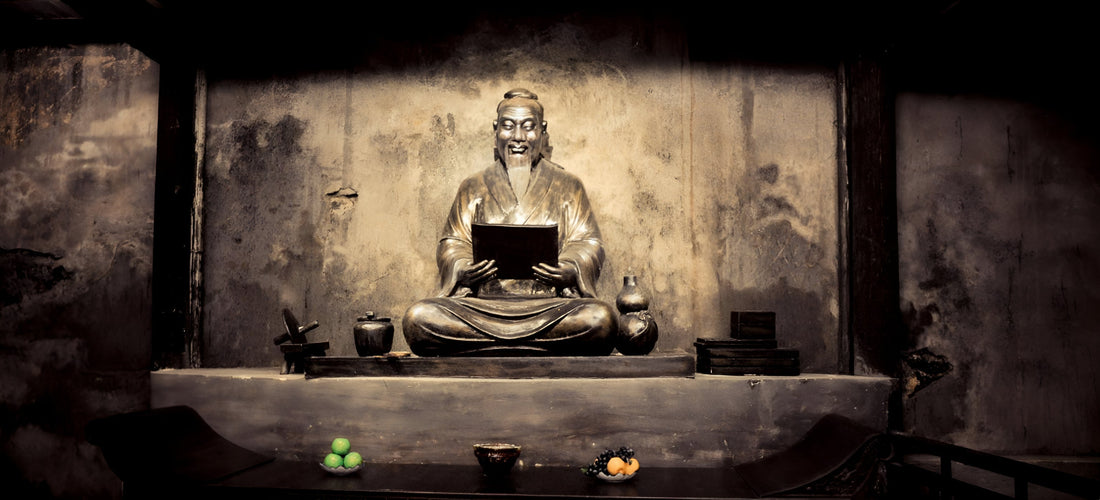
Chinese Tea and Virtue (De)
Share
In Daoism, tea is much more than a refreshing drink; it embodies the qualities of De (德), or Virtue—a concept central to Daoist philosophy. De can be thought of as the inner power or moral character that aligns with the Dao, the way of nature. Drinking tea is a quiet practice that invites us to cultivate virtues like humility, simplicity, patience, and inner clarity. Each sip reflects qualities that resonate deeply with Daoist values, making tea a symbolic and practical tool for embodying De in everyday life.
The Humility of Tea
One of the defining qualities of De is humility, the ability to act without ego or self-centeredness. Tea, in all its simplicity, symbolizes this virtue perfectly. It doesn’t boast or demand attention; instead, it offers a gentle presence that invites us to slow down and become present. In Daoist philosophy, humility isn’t about diminishing oneself, but rather about seeing oneself as part of the larger whole, connected to nature and others. Tea teaches this in its unassuming character—it asks for nothing, but offers calm and clarity.
Each time we drink tea with humility, we practice setting aside our pride, our judgments, and our need for control. By being present with the tea, we’re reminded to embrace life with a spirit of openness and modesty, an essential aspect of De.

Simplicity and Contentment
Another virtue, simplicity, is a cornerstone of Daoist practice. Daoists value simplicity not only as a way of living but also as a path to deeper understanding. Tea, at its essence, is simple—just leaves and water. There’s no need for extravagance; tea itself, when fully appreciated, is more than enough. This simplicity teaches us to seek contentment in the present moment and to find joy in what is already here.
In Daoist thought, De embodies this spirit of simplicity by focusing on what is essential. Drinking tea encourages us to step back from the complexities of life, appreciating beauty and peace in what is modest and unadorned. This practice of simplicity aligns us with the Dao, fostering a grounded, contented heart-mind.
Patience and Natural Timing
The virtue of patience is closely linked to Daoism’s concept of wu wei (non-action or effortless action), which teaches us to align with the natural flow rather than force things. Tea-making is an art of patience: the water must be heated to just the right temperature, the leaves need time to steep, and the flavors are best when allowed to develop naturally. Rushing the process diminishes the experience and the taste—much like forcing outcomes in life.
When we prepare and drink tea mindfully, we practice patience and learn to trust in natural timing. Daoism values this sense of timing as part of De, recognizing that all things have their own rhythms. Through tea, we learn to approach life with patience, allowing things to unfold rather than trying to control every detail. This patience fosters a deep inner peace and resilience, qualities that reflect true virtue.

Clarity and Inner Truth
Clarity of the heart-mind is another essential quality of De. Daoism encourages us to clear away delusions and distractions to see things as they truly are, a practice essential to cultivating wisdom. Drinking tea can become a ritual that clears the mind, helping us to reconnect with what is genuine and honest within ourselves.
Tea drinking is like a meditation that brings us back to clarity. When we sit with our tea, free from external pressures, we can observe our own thoughts, letting go of illusions and attachments. In this state of clarity, we become better attuned to our true nature, and from this understanding, we can act with virtue. This clear perspective is a key aspect of De, as it enables us to respond to life in an authentic and balanced way.
Harmony with Nature and Others
Tea, in its most traditional form, is a product of nature—cultivated, harvested, and prepared in harmony with the earth. Daoism teaches that true virtue includes living in harmony with nature and with others. When we drink tea, we’re partaking in the fruits of the earth, showing respect for the natural processes that brought it to us. This mindfulness encourages us to be aware of our connection to the earth and to others who have played a role in bringing the tea to our table.
By savoring tea with gratitude and respect, we honor the Daoist value of interconnectedness. This practice of harmony reminds us that De is not just an internal quality but also a way of interacting with the world—one that honors balance, respect, and connection.

Tea as a Path to Cultivating De in Daily Life
In Daoism, virtues are not abstract ideals but practical qualities that can be lived and experienced. Tea serves as a gentle guide, a daily reminder of these virtues that we can bring into our lives beyond the teacup. By approaching tea with humility, simplicity, patience, clarity, and respect for nature, we slowly shape our character in ways that align with De.
Make Tea a Daily Reflection: Each time you drink tea, take a moment to reflect on these virtues. Let humility, simplicity, and patience infuse your actions, even beyond the tea ritual.
Bring Awareness to Each Sip: Mindfully savoring each sip can teach us to appreciate life’s smaller moments, embracing simplicity and contentment.
Extend These Virtues to Everyday Actions: Just as tea invites presence and respect, we can bring these qualities to other aspects of life—whether in our relationships, work, or interactions with nature.
Through tea, we find a path to embodying De, allowing virtues to grow within us naturally. In this way, tea becomes a practice of not only drinking but also living in harmony with the Dao, aligning with the virtues that bring us closer to our truest selves.
_____
Learn more about Daoism, its philosophy and practice in the book series - Daoist Cultivation.
